- Home
- Frederick Marryat
The King's Own Page 8
The King's Own Read online
Page 8
CHAPTER EIGHT.
Now dash'd upon the billow, Our opening timbers creak, Each fears a watery pillow. ... To cling to slippery shrouds Each breathless seaman crowds, As she lay Till the day In the Bay of Biscay O! SEA SONG.
As it will only detain the narrative, without being at all necessary forits development, I shall not dwell upon the results of the engagement,which was soon after decided, with very indifferent success on our side.The soldiers were re-embarked, the ships hauled out of reach of theenemy's guns, and a council of war summoned--on which it was agreed,_nem con_, that no more was to be done. The despatches were sent home--they certainly differed a little, but that was of no consequence. Thesum total of killed and wounded was excessively gratifying to thenation, as it proved that there had been hard fighting. By-the-bye,John Bull is rather annoying in this respect: he imagines that no actioncan be well fought unless there is a considerable loss. Having no othermethod of judging of the merits of an action, he appreciates itaccording to the list of killed and wounded. A merchant _in toto_, hecomputes the value of an object by what it has cost him, and imaginesthat what is easily and cheaply obtained cannot be of much value. Theknowledge of this peculiar mode of reasoning on his part, has very ofteninduced officers to put down very trifling _contusions_, such as aprize-fighter would despise, to swell up the sum total of the loss tothe aggregate of the honest man's expectations.
To proceed. As usual in cases of defeat, a small degree of accusationand recrimination took place. The army thought that the navy might havebeaten down stone ramparts, ten feet thick; and the navy wondered whythe army had not walked up the same ramparts, which were thirty feetperpendicular. Some of the ships accused others of not having had asufficient number of men killed and wounded; and the boats' crews,whenever they met on shore, fought each other desperately, as if it wereabsolutely necessary, for the honour of the country, that more bloodshould be spilt. But this only lasted three weeks, when a moresuccessful attempt made them all shake hands, and wonder what they hadbeen squabbling about.
There was, however, one circumstance, which occurred during the action,that had not been forgotten. It had been witnessed by the actingcaptain of the ship, and had been the theme of much comment andadmiration among the officers and men. This was the daring feat of ourlittle hero, in rolling the shell over the side. Captain M--- (the newcommander), as soon as his more important avocations would permit, madeinquiries among the officers (being himself a stranger in the ship),relative to Willy. His short but melancholy history was soon told; andthe disconsolate boy was summoned from under the half-deck, where he satby the body of Adams, which, with many more, lay sewed up in hishammock, and covered over with the union-jack, waiting for the evening,to receive the rites of Christian burial, before being committed to thedeep.
Knowing that Adams had been his only protector, a feeling of compassionfor the bereaved and orphan boy, and admiration of his early tokens ofbravery, induced Captain M---, who never formed a resolution in haste,or abandoned it if once formed, to take the boy under his ownprotection, and to place him as an officer on that quarter-deck uponwhich he had so distinguished himself. Willy, in obedience to ordersreceived, stood by the captain, with his hat in his hand.
"What is your name, my boy?" said the captain, passing a scrutinisingglance over his upright and well-proportioned figure.
"Willy, sir."
"And what's your other name?"
"King's Own, sir."
This part of the boy's history was now explained by thesecond-lieutenant, who was in command, in consequence of thefirst-lieutenant being wounded.
"He must have a name," replied the captain. "William King's Own willnot do. Is he on the books?"
"No, sir, he is not; shall I put him down as William Jones, or WilliamSmith?"
"No, no, those are too common. The boy has neither father, mother, norname, that we know of: as we may, therefore, have a choice of the latterfor him, let it be a good one. I have known a good name make a man'sfortune with a novel reading girl. There is a romance in the boy'shistory; let him have a name somewhat romantic also."
"Ay, ay, sir," replied the lieutenant--"here, marine, tell my boy tobring up one of the volumes of the novel in my cabin."
The book made its appearance on the quarter-deck. "Perhaps, sir, we mayfind one here," said the lieutenant, presenting the book to the captain.
The captain smiled as he took the book. "Let us see," said he, turningover the leaves--"`Delamere!' that's too puppyish. `Fortescue!' don'tlike that. `Seymour!' Yes, that will do. It's not too fine, yetaristocratic and pretty. Desire Mr Hinchen, the clerk, to enter him onthe books as Mr William Seymour, midshipman. And now, youngster, Iwill pay for your outfit, and first year's mess: after which I hope yourpay and prize-money will be sufficient to enable you to supportyourself. Be that as it may, as long as you do credit to my patronage,I shall not forget you."
Willy, with his straw hat in one hand, and a supererogatory touch of hiscurly hair with the other, made a scrape with his left leg, after themanner and custom of seafaring people--in short, he made the best bowthat he could, observing the receipt that had been given him by hisdeparted friend Adams. D'Egville might have turned up his nose at it;but Captain M--- was perfectly satisfied; for, if not an elegant, itcertainly was a grateful bow.
Our young officer was not sent down to mess in the berth of themidshipmen. His kind and considerate captain was aware, that a lad whocreeps in at the hawse-holes--i.e., is promoted from before the mast,was not likely to be favourably received in the midshipmen's mess,especially by that part of the community who, from their obscureparentage, would have had least reason to complain. He was thereforeconsigned to the charge of the gunner.
Sincere as were the congratulations of the officers and men, Willy wasso much affected with the loss of his fond guardian, that he receivedthem with apathy, and listened to the applause bestowed upon his couragewith tears that flowed from the remembrance of the cause which hadstimulated him to the deed. At the close of the day, he saw the body ofhis old friend committed to the deep, with quivering lips and achingbrow,--and, as it plunged into the clear wave, felt as if he was leftalone in the world, and had no one to love and to cling to.
We do not give children credit for the feelings which they possess,because they have not, at their early age, acquired the power oflanguage to express them correctly. Treat a child as you would anequal, and, in a few months, you will find that the reason of his havinguntil then remained childish, was because he had heretofore been treatedas a being of inferior capacity and feelings. True it is, that at anearly age, the feelings of children are called forth by what we consideras trifles; but we must recollect, in humility, that our own pursuitsare as vain, as trifling, and as selfish--"We are but children of alarger growth."
The squadron continued to hover on the French coast, with a view ofalarming the enemy, and of making a more fortunate attempt, ifopportunity occurred. Early in the morning of the fourth day afterWilly had been promoted to the quarter-deck, a large convoy of_chasse-marees_ (small coasting vessels, lugger-rigged) were discoveredrounding a low point, not three miles from the squadron. A generalsignal to chase was immediately thrown out, and in half an hour theEnglish men-of-war were in the midst of them, pouring broadside afterbroadside upon the devoted vessels, whose sails were lowered in everydirection, in token of submission. The English men-of-war reminded youof so many hawks, pouncing upon a flight of small birds; and thevessels, with their lowered sails just flapping with the breeze, seemedlike so many victims of their rapacity, who lay fluttering on theground, disabled, or paralysed with terror. Many escaped into shoalwater, others ran ashore, some were sunk, and about twenty takenpossession of by the ships of the squadron. They proved to be part of aconvoy, laden with wine, and bound to the Garonne.
One of the _chasse-marees_, being a larger vessel than the rest, andladen with wine of a better quality, was directed by the commodore to besent
to England; the casks of wine on board of the others were hoistedinto the different ships, and distributed occasionally to the crews.Captain M--- thought that the departure of the prize to England would bea favourable opportunity to send our hero to receive his outfit, as hecould not well appear on the quarter-deck as an officer without hisuniform. He therefore directed the master's mate, to whose charge theprize was about to be confided, to take William with him, and wrote tohis friends at Portsmouth, whither the vessel was directed to proceed,to fit him out with the requisite articles, and send him back by thefirst ship that was directed to join the squadron. The prize wasvictualled, the officer received his written orders, was put on boardwith our hero and three men, and parted company with the squadron.
The master's-mate, who was directed to take the vessel to Portsmouth,was the spurious progeny of the first-lieutenant of a line-of-battleship, and a young woman who attended the bum-boat, which supplied theship's company with necessaries and luxuries, if they could afford topay for them. The class of people who obtain their livelihood by thesemeans, and who are entirely dependent upon the navy for theirsubsistence, are naturally anxious to secure the good-will of thecommanding officers of the ships, and usually contrive to have on theirestablishment a pretty-looking girl, who, although very reserved to thejunior officers of the ship, is all smiles to the first-lieutenant, andwill not stand upon trifles for the benefit of her employer. Beauty formen--gold for women! Such are the glittering baits employed, in thisworld, to entice either sex from the paths of duty or discretion.
The service was indebted to this species of bribery for the officer inquestion. The interest of his supposed father was sufficient to put himon the quarter-deck; and the profits of his mother, who, having dulyserved her apprenticeship, had arrived to the dignity of bumboat womanherself, and was a fat, comely matron of about forty years of age, weremore than sufficient to support him in his inferior rank. His educationand natural abilities were not, however, of that class to procure himeither friends or advancement; and he remained in the capacity ofmaster's-mate, and was likely long to continue so, unless some suchevent as a general action should include him in a promotion which wouldbe regulated by seniority. He was a mean-looking, vulgar little man,with a sharp face and nose--the latter very red, from the constantpotations of not only his own allowance, but of that of every youngsterin the ship whom he could bully or cajole.
His greatest pride and his constant study was "slang," in which he wasno mean proficient. He always carried in his pocket a colt (i.e. a footand a half of rope, knotted at one end, and whipped at the other), forthe benefit of the youngsters, to whom he was a most inordinate tyrant.He could judge a day's work, which he sent in with the rest of themidshipmen, and which proofs of theoretical knowledge of theirprofession were in those days little attended to; but he was veryignorant, and quite unfit to take charge of any vessel. Captain M---,who, as we before stated, had joined the ship as acting captain, and hadnot had time to ascertain the merits or demerits of the officers, hadgiven the prize to his charge because he was the senior mate of theship.
The prize had scarcely trimmed her sails and shaped her course, when MrBullock, the master's-mate, called our hero to him, and addressed him inthe following elegant phraseology:--
"Now, you rebellious spawn--touch your hat, you young whelp,"--(knockingoff poor Willy's only hat, which flew to leeward, and wentoverboard)--"mind what I say, for I mean to be as good as a father toyou. You're not an officer yet--and if you were, it would be all thesame--so no capers, no airs. You see I've only three men in the vesselbesides myself; they are in three watches; so your duty will be toattend to me in the cabin. You'll mull my claret--I always drinks anoggin every half-hour to keep the wind out, and if it an't ready andan't good--do you see this?"--(taking the colt out of his pocket.)
"Stop, you'd better feel it at once, and then, when you knows what thetaste of it is, you'll take care how you're slack in stays." So saying,he administered three or four hearty cuts on the back and shoulders ofour hero, who had been sufficiently drilled into the manners and customsof a man-of-war, to know the value of the proverb, "The least said, thesoonest mended."
A spigot had been already inserted into one of the casks of claret whichwere lashed on deck; and, as the small vessel was very uneasy in theheavy swell of the Bay of Biscay, our hero had sufficient employment inwatching the pot of claret, and preventing it from being upset by themotion of the vessel, as it was constantly heating on the stove in thecabin. This potation was regularly presented by Willy every half-hour,as directed, to his commanding officer, who, if it was too sweet, or notsweet enough, or if he could not drink the whole, invariably, and muchto the annoyance of our hero, threw the remainder into his face, tellinghim that was his share of it.
This arrangement continued in full force for three days and threenights--for Willy was roused up five or six times every night toadminister the doses of mulled claret which Mr Bullock had prescribedfor himself, who seemed, thin and meagre as he was, to be somewhat likea bamboo in his structure (i.e. hollow from top to bottom), as if toenable him to carry the quantity of fluid that he poured down his throatduring the twenty-four hours. As for intoxicating him, that appeared tobe impossible: from long habit, he seemed to be like a stiff ship thatcareened to her bearings, and would sooner part company with her maststhan heel any further.
On the fourth day, a strong gale sprang up from the north-west, and thesea ran very high. The _chasse-maree_, never intended to encounter thehuge waves of the Bay of Biscay, but to crawl along the coast and seekprotection from them on the first indication of their fury,--labouringwith a heavy cargo, not only stowed below, but on the decks,--was notsufficiently buoyant to rise on the summits of the waves, which made aclean breach over her, and the men became exhausted with the wet and theinclemency of the season. On the third day of the gale, and seventhsince they had parted company with the fleet, a squall brought themainmast by the board; the foresail was lowered to close-reef, when aheavy sea struck the vessel, and pouring a torrent over her decks, sweptoverboard the three men who were forward reefing the sail. Mr Bullock,the master's mate, was at the helm--Willy, as usual, down below,attending the mulled claret, which had been more than ever in requestsince the bad weather had come on.
The mate quitted the helm, and ran forward to throw a rope to the seamenwho were struggling in the water with the wreck to leeward. He threwone, which was seized by two of them (the other had sunk); and as soonas they had hold of it and it became _taut_ from their holding on, heperceived to his dismay that he had stood in the remaining part of thecoil, and that it had encircled itself several times round his body, sothat the men were hauling him overboard. "Let go, let go, or I'moverboard!" was a useless exclamation to drowning men; they held on, andthe mate too held on by the rigging for his life,--the efforts of thedrowning men dragging him at last from off his legs, and keeping hisbody in a horizontal position, as they hauled at his feet, and he clungin desperation to the lee-shrouds. "Willy, Willy, a knife--quick,quick!" roared the mate in his agony. Willy, who, hearing his namecalled, and followed up by the "quick, quick," had no idea that anythingbut the mulled claret could demand such unusual haste, stopped a fewseconds to throw in the sugar and stir it round before he answered thesummons. He then started up the hatchway with the pot in his hand.
But these few seconds had decided the fate of Mr Bullock, and asWilly's head appeared up the hatchway, so did that of Mr Bullockdisappear as he sank into a grave so dissonant to his habits. He hadbeen unable to resist any longer the united force of the drowning men,and Willy was just in time to witness his submersion, and find himselfmore destitute than ever. Holding on by the shroud with one hand, withthe pot of mulled claret in the other, Willy long fixed his eyes on thespot where his tyrannical shipmate had disappeared from his sight, and,forgetting his persecution, felt nothing but sorrow for his loss.Another sea, which poured over the decks of the unguided vessel, rousedhim from his melancholy reverie, a
nd he let go the pot, to cling withboth hands to the rigging as the water washed over his knees,--then,seizing a favourable opportunity, he succeeded in regaining the cabin ofthe vessel, where he sat down and wept bitterly--bitterly for the lossof the master's mate and men, for he had an affectionate and kindheart--bitterly for his own forlorn and destitute situation. Old Adamshad not forgotten to teach him to say his prayers, and Willy had beenaccustomed to read the Bible, which the old man explained to the best ofhis ability. The vessel laboured and groaned as she was buffeted by thewaves--the wind howled, and the sea struck her trembling sides andpoured over her deck. In the midst of this wild discord of theelements, the small voice of the kneeling child, isolated from the restof the world, and threatened soon to be removed from it, was not unheardor unheeded by an omniscient and omnipotent God, who has said that not asparrow should fall to the ground without his knowledge, and has pointedout of how much more value are we than many sparrows.
Willy ended his devotions and his tears; and, feeling wet and cold,recollected that what would warm his departed friend the mate, wouldprobably have the same effect upon him. He crawled up thecompanion-hatch with another tin pot, and having succeeded in obtainingsome wine from the cask, returned to the cabin. Having warmed it overthe fire, and sugared it according to the well-practised receipt of MrBullock, he drank more of it than, perhaps, in any other situation, hewould have done, and, lying down in the standing bed-place at the sideof the cabin, soon fell into a sound sleep.

 The Children of the New Forest
The Children of the New Forest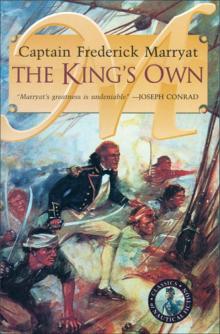 The King's Own
The King's Own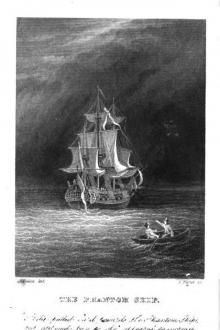 The Phantom Ship
The Phantom Ship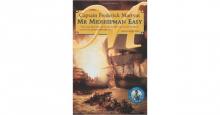 Mr. Midshipman Easy
Mr. Midshipman Easy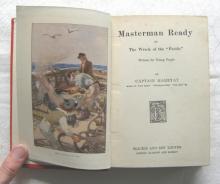 Masterman Ready; Or, The Wreck of the Pacific
Masterman Ready; Or, The Wreck of the Pacific Peter Simple; and, The Three Cutters, Vol. 1-2
Peter Simple; and, The Three Cutters, Vol. 1-2 Travels and Adventures of Monsieur Violet
Travels and Adventures of Monsieur Violet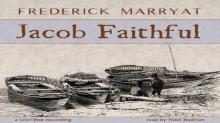 Jacob Faithful
Jacob Faithful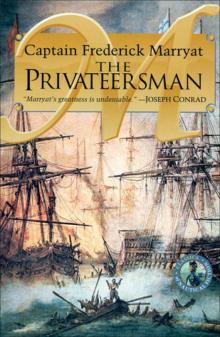 The Privateersman
The Privateersman Newton Forster
Newton Forster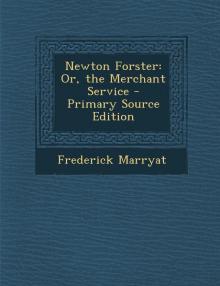 Newton Forster; Or, The Merchant Service
Newton Forster; Or, The Merchant Service The Pacha of Many Tales
The Pacha of Many Tales The Privateer's-Man, One hundred Years Ago
The Privateer's-Man, One hundred Years Ago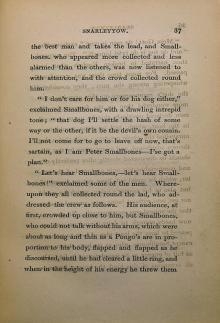 Snarleyyow, or, the Dog Fiend
Snarleyyow, or, the Dog Fiend Percival Keene
Percival Keene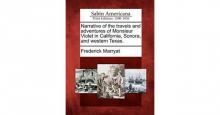 The Travels and Adventures of Monsieur Violet in California, Sonora, and Western Texas
The Travels and Adventures of Monsieur Violet in California, Sonora, and Western Texas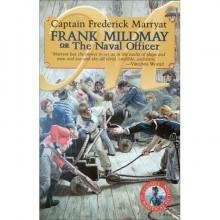 Frank Mildmay; Or, the Naval Officer
Frank Mildmay; Or, the Naval Officer The Mission
The Mission